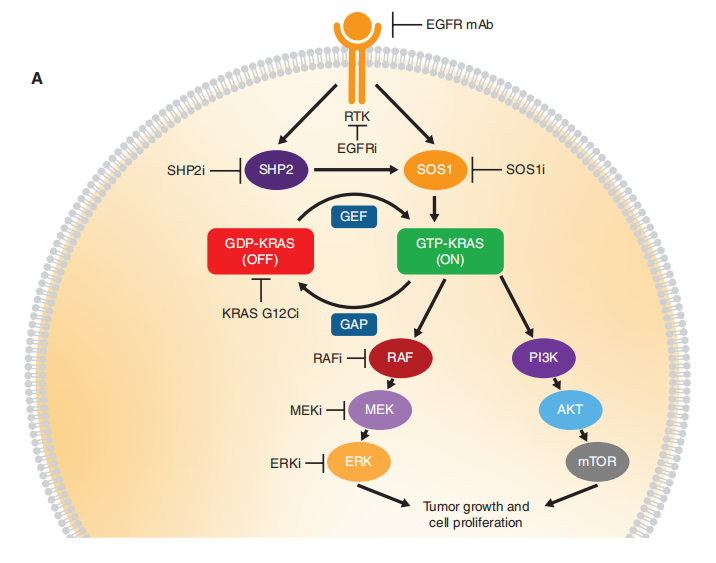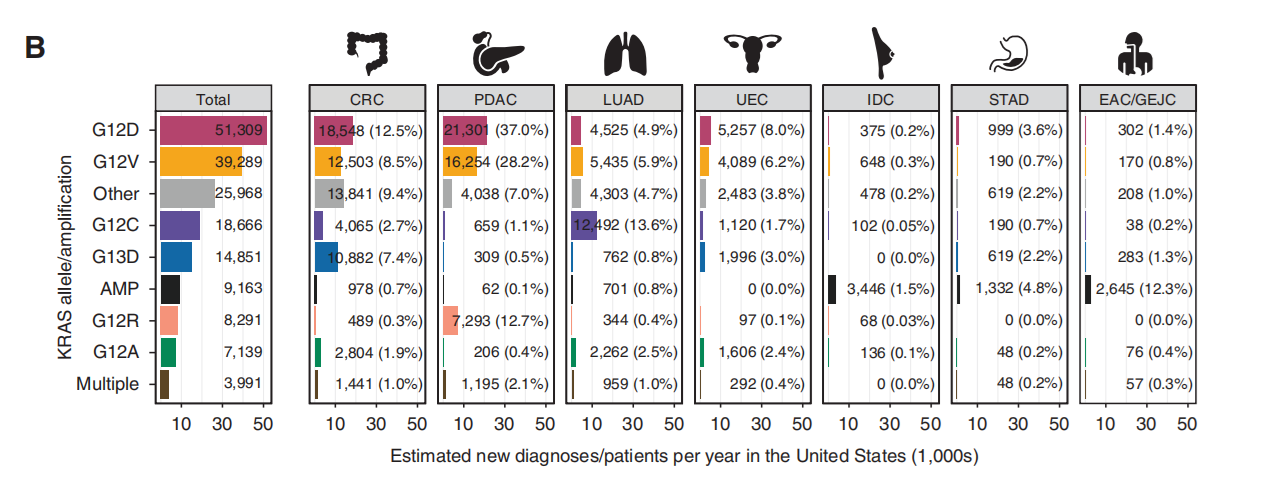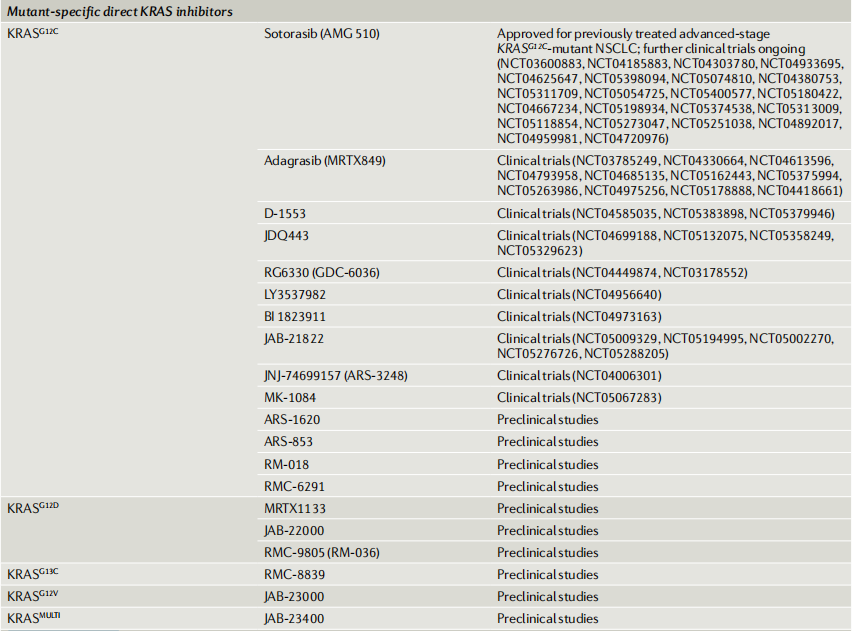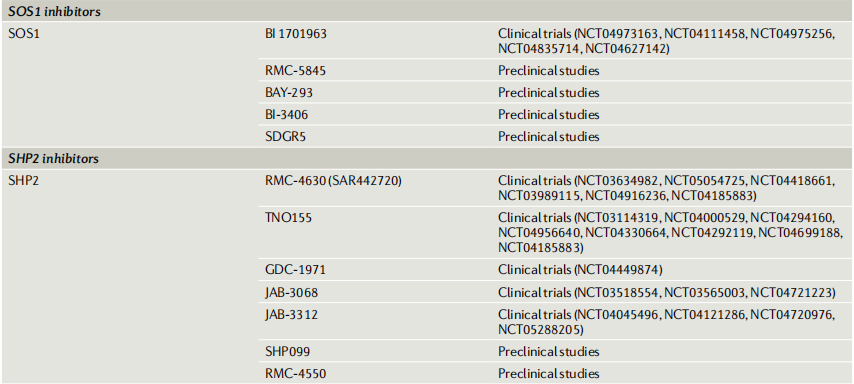Current location: Home > NEWS > Industry news
NEWS
PRODUCTS
What’s the common oncogenic gene "KRAS"
News source: Release time:[2023-02-13]
Introduction to the KRAS gene
In 2020, there will be approximately 19.3 million new cancer cases worldwide, including 1.8 million new cancer cases in the United States alone. KRAS gene mutations are found in approximately one in seven human cancers, and the KRAS gene has become one of the major oncogenic drivers of human cancer [1].
KRAS-Kirsten rats arcomaviral oncogene homolog
The RAS protein is a small membrane-bound GTPase (GTP hydrolase) that acts as a switch for a variety of cellular signaling functions.
KRAS gene signalling pathway

Receptor monomers such as EGFR on the cell membrane bind to extracellular membrane ligands to form dimers, which phosphorylate themselves and then phosphorylate downstream signalling proteins. One of these signalling pathways activates the SOS protein, which in turn activates the KRAS protein.
KRAS proteins shift between inactivated and activated states, with KRAS being inactivated when bound to guanine diphosphate (GDP) and activated when bound to guanine triphosphate (GTP), which activates downstream signalling pathways.
KRAS is inactivated in most cells and, when activated, can activate multiple downstream signalling pathways, including PI3K and MAPK signalling pathways, to promote cell proliferation and survival.
KRAS genes and tumours
KRAS mutations and/or KRAS wild-type amplifications were frequently seen in colorectal cancer (45% in the US, 49% in China), pancreatic cancer (90% in the US, 87% in China) and NSCLC (35% in the US, 13% in China). In the US, KRAS G12C is the most common KRAS mutation in NSCLC patients, while KRAS G12D and KRAS G12V are the most common mutations in colorectal and pancreatic cancers [2].

KRAS G12C was the most common KRAS mutation in NSCLC patients, with KRAS G12D and KRAS G12V following in second and third place, according to a multi-centre (mCohort) data on KRAS mutation status in 40,804 NSCLC patients[3].

Breakthrough in targeting KRAS drugs
In the past, KRAS mutations were considered "undruggable". But this has recently changed!
On 29 May 2021, the US Food and Drug Administration (FDA) approved the marketing of the anti-cancer drug Sotorasib, breaking the deadlock of no targeted drug for KRAS mutations! Sotorasib is a small molecule inhibitor that selectively targets KRAS (G12C), which specifically and irreversibly locks KRAS in an inactive GDP-binding state in the KRAS drug under development. [4]
On December 12, 2022, the U.S. Food and Drug Administration (FDA) granted accelerated marketing approval for Mirati's KRAS inhibitor Krazati (adagrasib) for the treatment of patients with non-small cell lung cancer (NSCLC) carrying a KRAS G12C mutation who have received at least one prior systemic therapy. Patients with locally advanced or metastatic non-small cell lung cancer. This is the second FDA-approved targeted drug to directly inhibit KRAS mutant activity. [4]
KRAS-targeting drugs in development
There are currently two classes of targeted KRAS drugs in development: mutant-specific KRAS inhibitors and pan-KRAS inhibitors.
Mutant-specific KRAS inhibitors account for the majority of the drugs, and the two approved targeted KRAS drugs are both mutant-specific KRAS inhibitors.

Pan-KRAS inhibitors can be subdivided into two categories: indirect inhibition and direct inhibition.
Pan-RAS inhibitors:

Indirect inhibition strategy: the main targets include SOS1 and SHP2.

SpaceGen K-ras Gene Mutations Detection overall solution

Features & Advantages
Accuracy and Reliability: Use sub-packed PCR tube to effectively avoid cross-contamination.
High Sensitivity: In the 10 ng DNA sample that can be detected, the lower limit of detection for mutations detected in Kras-8 and Kras-10 reaction tubes is 5%, and the lower limit of detection for other mutation loci is 1%.
Ease of Use: Based on technology PAP-ARMS®, one step detection in 90 mins.
Great versatility:Validated on the most common qPCR machines with stable results.
Reference
[1] The current state of the art and future trends in RAS-targeted cancer therapies. Nat Rev Clin Oncol.2022 Aug 26 : 1–19.
[2] Hofmann et al., (2022). Expanding the Reach of Precision Oncology by Drugging All KRAS Mutants. Cancer Discovery, doi: 10.1158/2159-8290.CD-21-1331
[3] Biomark Res. 2020 Jun 25;8:22.
[4] https://www.fda.gov/